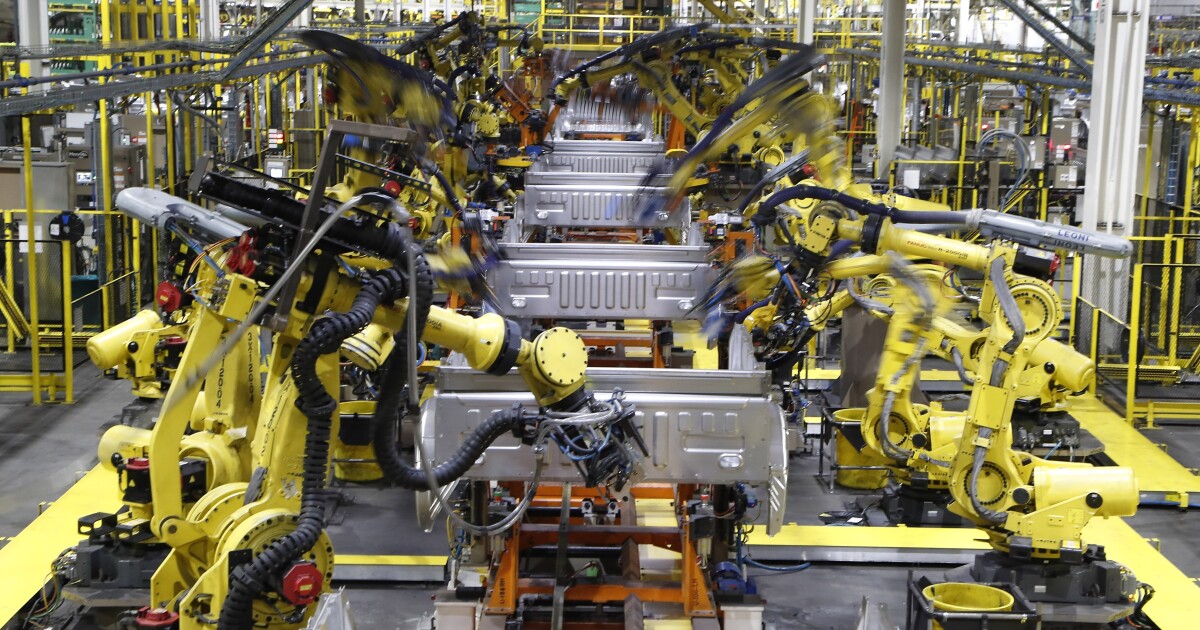

The nation’s largest auto union is digging in its heels in the final hours of its contract negotiations with the Big Three automakers, raising the specter of a historic strike that threatens to upend United States manufacturing and cause billions of dollars in economic losses.
The United Auto Workers union has vowed to strike if it does not reach consensus with the Big Three automakers (General Motors, Ford, and Stellantis) in its contract negotiations, which expire Thursday at midnight.
MEDIAN HOUSEHOLD INCOME FELL IN 2022, ADJUSTED FOR INFLATION, CENSUS BUREAU SAYS
In the final hours of talks, both sides are expressing hope that they might still be able to hammer out a deal. But their window to do so is quickly shrinking.
“We’re making progress, but it’s slow. The clock is ticking,” UAW President Shawn Fain said Wednesday. “We’ve got a lot of work to do.”
Strike fears
Fain reiterated Wednesday that the union is prepared to strike unless all three automakers meet their demands. “As it stands right now, all three are most likely to be struck unless we get a deal by Sept. 14 at midnight,” Fain said on CNBC’s Squawk Box. “All three are expected to deliver for their workers and if they don’t, there will be action.”
Any coordinated UAW strike would be the first-ever work stoppage to involve all three Big Three Detroit automakers. It could also be economically devastating.
An estimate from the Anderson Economic Group found that just a 10-day work stoppage at the plants would result in $900 million in losses for UAW workers and $1 billion in losses for the automakers themselves, including their shareholders. And it would cost the U.S. economy $5.6 billion.
In recent days, UAW has raised the prospect of conducting strikes at targeted auto plants in Michigan if a deal is not met before the Sept. 14 deadline, according to the Detroit Free Press. Fain is expected to elaborate on those plans at a closed-door union meeting Wednesday evening.
Targeted strikes involve work stoppages at certain local plants, rather than at a national level, and could allow the UAW to extend the time it has to pressure automakers before exhausting its $825 million strike fund. But it’s also highly risky, threatening to grind U.S. auto manufacturing activity to a halt.
“The idea of ‘targeted strikes’ that they’ve brought forward in the last 24 hours is clearly intended to keep the strike going longer,” Patrick Anderson, the CEO of the Anderson Economic Group, whose clients include GM and Ford, told the Washington Examiner in an interview. “But it has the potential risk of causing a shutdown at many points, not just the ones that they pick as strike targets.”
It’s a “risky strategy,” and one that has “considerable risks for UAW and its automakers,” Anderson said. “It would have significant costs throughout the industry — including to workers and suppliers, who may not be associated with those specific plants.”
The UAW’s 2019 strike at GM, which lasted 42 days and involved some 48,000 union workers, caused an estimated $4 billion in damage to the auto industry as a whole, Anderson said, much of which was concentrated in Michigan.
A long strike in 2023 would cause Michigan and other auto industry-reliant states in the Midwest to go “into a recession,” he added.
Where things stand
Negotiations on the four-year contract, which covers roughly 150,000 auto workers, began in July. Talks have been both protracted and tense, kicking off with a traditional handshake meeting, during which Fain refused to shake hands with the CEOs in attendance, and have yielded only marginal gains in the months since.
The UAW is pushing for double-digit wage hikes, cost of living increases, and other benefits, such as defined pension benefits for all employees and 32-hour workweeks, and has made clear they plan to strike if their demands are not met.
But with hours left before the clock runs out, much daylight remains between the two sides.
Automakers have worked to better their offers in recent weeks.
Earlier this week, Stellantis put forth an offer that would increase union wages by 14.5% over the length of the four-year contract. GM also offered a 10% wage increase, including two 3% annual lump sum payments, and Ford came back with a 10% wage increase on Monday — upping its original amount after the union rejected its 9% offer. All include inflation protection payments, and all reduce the time necessary to reach higher wage tiers for employees.
Ford CEO Jim Farley said Wednesday that the offer is the best it has made to the UAW in its 80-year relationship with the union, noting that it includes “pay increases, elimination of tiers, inflation protection, five weeks of vacation, 17 paid holidays, [and] bigger contributions for retirement.”
Still, he said, there were limits to what Ford was willing to offer, such as a four-day workweek.
“We’re absolutely ready for a strike and I know the UAW is too,” Farley told reporters in Detroit. “But we don’t want it to come to a strike.”
While Fain acknowledged the new overtures he still rejected the automakers’ offers via a Facebook Live video this week filmed in front of a trash can marked “Big Three Proposals.”
Fain, who was elected as UAW president earlier this year, has already gained a reputation for his aggressive leadership style and willingness to go for the jugular. He has taken to addressing the public directly in Facebook Live videos, including one where he threw a contract proposal from Stellantis into a trash can to show his displeasure.
The offers showed movement, Fain said in the video, but were still “deeply inadequate.”
The view from Washington
A strike would be politically damaging to President Joe Biden because it would inflict major pain on union workers and the automakers and would add inflation due to shortages and higher prices in the run-up to 2024.
For Biden, “Inflation is an already big bugaboo that he faces going forward to the next election” and something that a strike could exacerbate,” Gary Clyde Hufbauer, a nonresident senior fellow at the Peterson Institute for International Economics, told the Washington Examiner.
Biden, alarmed by the possibility of a strike, has sought to involve himself more closely in negotiations in recent weeks. He has spoken to both UAW leaders and automakers in recent days and has “encouraged the parties to stay at the table and to work 24/7 to get a win-win agreement that keeps UAW workers at the heart of our auto future,” White House economic adviser Jared Bernstein told reporters Wednesday.
Biden also spoke to the heads of all three auto companies last week to “encourage them to provide more forward-leaning offers to stay at the table,” Bernstein added.
Other Democrats, including former House Speaker Nancy Pelosi (D-CA), have offered union support.
In a statement, Pelosi referenced the 2008 auto bailout as she noted that the companies “have the means and the opportunity to invest in their workers,” and offered her backing of UAW as they seek “a hard-earned pay raise, especially respecting new workers, as well as better working conditions and the job security that they deserve.”
Sen. Bernie Sanders (I-VT) has also been especially vocal in his support for the UAW during the negotiation process and is slated to appear at a rally alongside Fain on Friday.
“UAW members are fighting not only for themselves but against a corporate culture of arrogance, cruelty, and selfishness causing massive and unnecessary pain for the majority of working families throughout the country,” Sanders wrote in an op-ed published by The Guardian this week.
CLICK HERE TO READ MORE FROM THE WASHINGTON EXAMINER
Fain, for his part, dismissed economic concerns of a potential UAW strike as “fear-mongering,” saying Wednesday afternoon that the union actions would be more likely to wreck the “billionaire economy” than the regular economy.
“It’s interesting to me, all of a sudden the fear mongers get out there and start talking about how this is going to wreck the economy,” Fain told ABC News. “It’s not going to wreck the economy. It’s going to wreck the billionaire economy,” he said.





